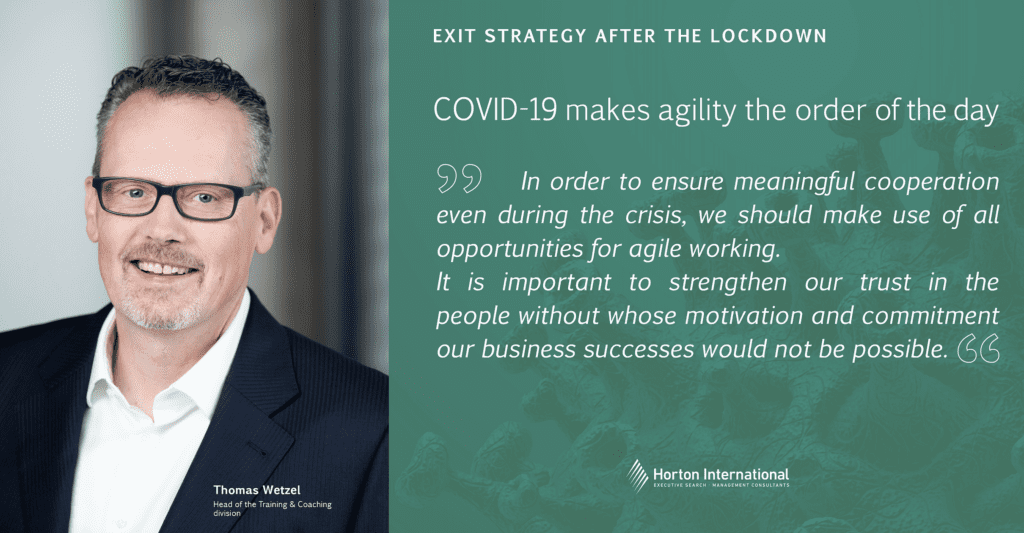The current conditions of our cooperation breathe new life into the business buzzword “agility”. Companies, as well as their employees, experience what they are capable of doing and what they can move.
One could say that COVID-19 is what the eruption of Vesuvius in 79 BC was for the region on the Gulf of Naples: a disruptive event that led to a complete overhaul of economic and social life. As Homo sapiens, we once again have the chance to prove why our species has made it this far. In times of crisis, we stand and act together. Instead of burying our heads in the sand, we start to work together on reconstruction immediately after the disruptive event.
Until a few weeks ago, cooperation and physical proximity were closely linked. However, due to the recently adopted ban on contact and the measures taken to contain further infections, this is now no longer possible – in some cases even forbidden. Companies not only have to react, but also be agile. Agility means being able to adapt flexibly to “unforeseen events and new requirements”, whereby this is not only done reactively but proactively (Gabler).
Even traditional companies, in which home office was previously considered a no-no, are forced to enable their employees to work mobile and agile within a very short time. One of our customers sets a good example of this, where working from home was previously only possible in exceptional cases and after informal consultation with the direct superior. Within just 48 hours, this customer created an IT infrastructure that enables 80 percent of the 380 employees to work outside of the office. The employees quickly found their way around and the work flow, especially in an international context, increased rapidly. Strategic decisions were also made within a very short time and brought into sequential implementation. The example shows: It works. In the current crisis, both companies and employees are experiencing what they are capable of and what they can achieve. Agility thrives on inspired and committed employees who show passionate commitment to secure their company, their jobs and those of other employees.
That’s why it’s time to put our technical achievements of the past 30 years to work under real conditions. Any questions we may have, and any doubts that have kept us from doing so, are now fading into the background. Without alternatives, we are forced to act. But even if we feel thrown in at the deep end and open questions remain, in the end, we will get practical answers to them.
Emerge from the crisis strengthened and with proven insights
By evaluating our actions since the beginning of the crisis, we will learn what is possible, what we are good at or where we may not have been so good in the past, what we have over- or underestimated so far and what we need to change in the future based on evidence. In short, we now need to transform the vast amount of knowledge we have accumulated into action – and in doing so, take into account the buzzword “transformation”. Of course, we will make mistakes in the process, after all the situation is new – and hopefully unique. But we will learn from it and emerge stronger, with insights proven in practice.
Humanity has gained experience in dealing with crises over thousands of years. The positive this time: Our familiar surroundings and our home will still be there after the crisis. When we look out the window of our home office, we see intact streets. Our house is also there as always and is not, as it was for the generation of our parents or grandparents during the Second World War, in ruins. We no longer waste our lives on motorways, in crowded trains, at train stations or airports. Instead, we sit in our comfortable homes and can be close to the people we care about. With this, New Work has gone live and is no longer a utopia. From this point of view, the current situation caused by COVID-19 may not seem so bad anymore.
Conclusion
In order to ensure meaningful cooperation even during the crisis, we should make use of all opportunities for agile working. It is important to strengthen our trust in the people without whose motivation and commitment our business successes would not be possible. It is also important in this phase to be courageous. This does not mean not being afraid, but to deal with fear in a success-oriented way. When, in the end, the state of affairs that we describe as normal has returned, we will draw a joint summary of our actions during the crisis in order to be well prepared for the next disruptive event.








